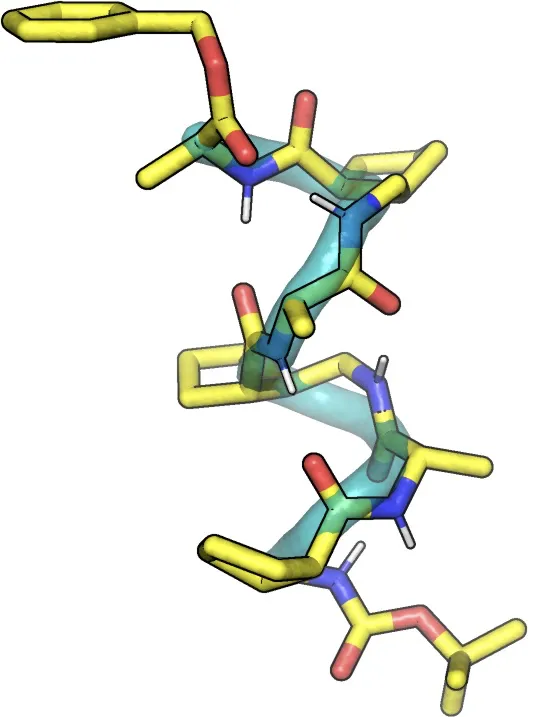This network grant enables anyone working on foldamers – or who wants to – to connect and share expertise on this emerging technology."
Professor André Cobb
25 November 2024
King's Chemist to lead national network aimed at building artificial molecules
Professor André Cobb has received a £0.75 million EPSRC Network Grant to exploit this technology for health, materials and catalysis applications

Professor André Cobb in the Department of Chemistry has received an EPSRC Network Grant to establish a UK network dedicated to exploring how synthetic molecules, called ‘foldamers’, could be used to tackle challenges in health, materials and net zero.
Led by King’s College London, with the help of the Universities of Birmingham, Durham and Edinburgh, the nationwide network - FoldNetUK - will draw upon expertise from around the country to advance the wide-ranging applications of foldamers, including for drug discovery, new materials, agrochemicals and catalysis.
Designed to imitate peptides, sequences of naturally occurring amino acids, foldamers appear linear but can fold into complex higher order structures like helices and sheets. This means that parts of the foldamer that are far apart can, like a peptide, be brought closer together in three-dimensional spaces. This folding enables the unit to achieve different functions, depending on the folding pattern, which can be exploited across a range of applications.
For example, the precisely arranged chemistries can be used to catalyse chemical reaction processes in the same way achieved by enzymes. They can also be used to bind to drug targets with high specificity. Furthermore, unlike peptides found in nature, which degrade over time, foldamers are more stable, meaning they can be used for longer lasting therapeutics.
Professor Cobb said, “this network grant enables anyone working on foldamers – or who wants to – to connect and share expertise on this emerging technology. The aim is to launch new collaborations across a diversity of scientific communities, including through various seed-funding opportunities, to explore the huge potential of foldamers and drive forward their wide-ranging applications.”
EPSRC Network Grants provide major investment that supports new collaborative, multidisciplinary research around the country. They provide a critical mass of expertise by developing interactions within the research community, to help boost emerging research areas, and connect the network with relevant science, technology and industrial groups outside of academia.
FoldNetUK will support both established and early career scientists to network across the country, including through cross lab visits, workshops, annual meetings, talks and more. The think tank – WISC – Women in Supramolecular Chemistry – will also be involved in the Network, aiming to boost the careers of women scientists involved in this work.

Professor Cobb is an expert in homogeneous catalysis, and developed with his group a new type of foldamer helix that enables more controlled and novel forms of catalysis. He hopes FoldNetUK will enable scientists working in this area to exploit the potential of foldamer structures across the Network for use in wide-ranging reactions, including creating more sustainable forms of catalysis that don’t require rare earth minerals.
Other members of the network will be exploring the potential for foldamers to be used in medicinal chemistry that will inhibit disease-causing protein interactions in the body, preventing diseases including cancer from taking hold.
Foldamers can be designed and exploited for countless application areas. This Network aims to make people within the field and outside of it aware of the remarkable diversity of foldamer structures and wide range of applications."
Professor André Cobb
Another focus of the network will be the development of new materials with cutting edge properties. For example, some foldamers can be designed to recognise other small molecules that could be exploited as tools in diagnostics.
Professor Cobb said, “Foldamers can be designed and exploited for countless application areas. This Network aims to make people within the field and outside of it aware of the remarkable diversity of foldamer structures and wide range of applications.
“For example, the hope is a scientist involved in say medicinal chemistry might see a foldamer used in catalysis that could be an ideal set-up for a drug target.
“Repurposing known structures and collaboratively designing new ones, are just some of the benefits this network will bring. It will also enable us to share these cutting edge tools with scientists outside of the field as well as with industrial partners who stand to benefit.”

